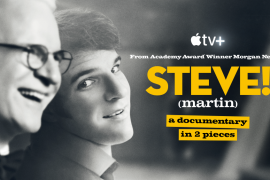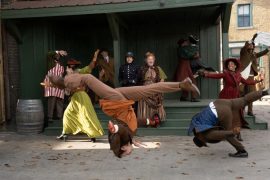 |
| Da Vinci’s Inquest: why didn’t it spark a new Golden Age of Canadian TV? |
Drop whatever you’re doing and go read John Doyle in Thursday’s Globe and Mail. Right now. If there’s a pay wall go out and buy a copy.
John asks: Where is Canada in the golden age of TV? Basically, where’s our Mad Men, Breaking Bad or The Sopranos?
Stuck in Chris Haddock’s head, he concludes, or Mike Clattenberg’s.
Haddock’s Da Vinci’s Inquest, it could be argued, was where this whole new “Golden Age” of TV drama began–unless, like Alan Sepinwall, you count HBO’s Oz, which premiered the year before in 1997.
So why no next shows from these auteur’s? Haddock followed Da Vinci at CBC with Intelligence, also Golden Age-worthy. The problem was, viewing levels plunged. Therein lies the catch with these dense, dark, “Golden Age” dramas–they’re not for everybody.
In order to sustain their costs, Canadian broadcasters need to aim their shows at the biggest possible room, because even our biggest room is one-tenth the size of theirs. What plays in that big room is NCIS, Grey’s Anatomy and Bones. Hence Murdoch Mysteries, Motive and Republic of Doyle.
Good but none of them a Breaking Bad, says Doyle. Even when our cable or specialty channels invest in Canadian content, the result is “deflating and inadequate,” he finds.
Hard to argue with that, although I’d say Slings & Arrows was a brilliant Canadian specialty show, and Less Than Kind punched above its weight.
These shows, however, rarely earn their keep in Canada. If CBC managed its appropriation right, it could indulge in a loss leader or two to distinguish its brand. A Haddock hour, drawing 300,000 a week, would give a CBC schedule a golden sheen you could not find on the private channels.
What killed things, however, was Michael: Tuesdays & Thursdays. Here was Canada’s Golden Age comedy, a smart, funny, original show told with a flourish by a brilliant creative team. In my opinion, it stands with any comedy ever on FX, HBO or NBC.
Yet hardly anybody watched. CBC, chasing a million viewer mandate, quickly ran out of courage.
The ratings, however, should not have been a total surprise. Look at most regular in-season episodes of the recent critics’ darlings. Deadwood pulled around two million, tops, on HBO. Friday Night Lights stumbled so badly on NBC it only survived after a deal with satellite distributor DirecTV, as did FX’s briefly brilliant Damages.
For the most part, FX, AMC and HBO could live with those low audience levels because they won awards, drove subscriptions and delivered a small but loyal and affluent audience and thus had some value to advertisers. As long as AMC or FX can tell Honda or Apple a million well-off 18-49-year-olds will be very engaged each week by an episode of Mad Men or Justified, the show will go on.
In Canada, on the other hand, it is not enough for Global to tell its advertisers it could promise them 100,000 A18-49. CBC was in that same boat with Michael; no audience, no advertising, no second season.
The grim conclusion seems to be that Canada can’t afford to make brilliant television. I’m sure the gang back at SCTV would find that notion very amusing.
You also have to take into account the talent drain. Some of Canada’s best and brightest contribute to American Golden Age shows, including Mad Men, Justified, The Americans and 24. Many of our best want to take part in the U.S. revolution.
Doyle, however, is in no mood for rationalization. He goes on to write that “the emblem of worth in Canadian TV is having a series picked up by a U.S. network,” adding that the “paucity of creative ambition is stunning.” He also rails against the “depth of arrogance and delusion” in the Canadian TV industry, pointing the finger at “a cabal of loud-voiced complainers.” Then he flips over a few tables and burns down the bar. It’s a great, crackling read, spoiling for about 20 fights that all need to happen. Check it out here.






